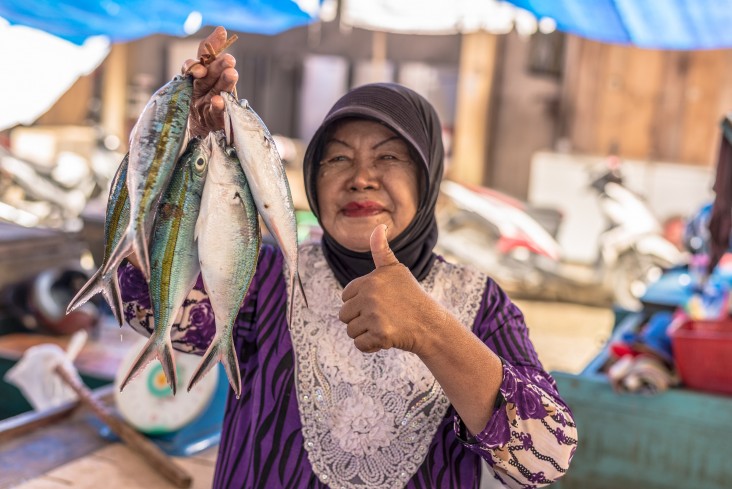Speeches Shim

Millions of people depend heavily on Indonesia’s rich natural resources for food, shelter, water, energy, and jobs. Under the U.S.-Indonesia Strategic Partnership, the United States through the United States Agency for International Development (USAID) advances Indonesia’s ability to balance sustainable use and protection of its natural resources with long-term economic growth. USAID’s partnerships support stability and prosperity for Indonesia, the Indo-Pacific region, and the United States.
USAID works closely with the Government of Indonesia (GOI) and other key partners on shared environmental priorities including improving natural resources management; promoting reliable and sustainable energy; increasing access to safe drinking water, sanitation, and hygiene (WASH) in urban areas; countering wildlife trafficking and illegal, unreported, and unregulated fishing; and conserving terrestrial and marine biodiversity. Further, USAID enhances Indonesia’s ability to prepare for, respond to, and recover from natural disasters and humanitarian crises.
-
Since 2015, USAID has mobilized approximately $1.62 billion in renewable energy investments, which will provide access to clean energy for over 5.3 million Indonesians.
-
Over the past four years, USAID has increased access to improved water sources for over 900,000 people and to safely managed sanitation services for over 600,000 people.
-
USAID helped over 2,000 small-scale vanilla farmers in Papua attain Rainforest Alliance Sustainable Agriculture Standard certification for their farms, allowing them to earn a premium price for their products.
-
USAID collaborated with the Government of Indonesia and others to improve the management and/or development of 26 Marine Protected Areas (MPAs) totaling 5.2 million hectares, an area nearly as large as Lake Michigan. These efforts benefited the livelihoods of over 180,000 people, protected key ecosystems and species, and reduced poaching by as much as 70 percent in certain MPAs.
CURRENT PROGRAMS
ENVIRONMENTAL SECURITY AND RESILIENCE
FISHERIES AND MARINE BIODIVERSITY Indonesia is the second largest producer of fish and fish products worldwide, and the U.S. remains one of its top destination markets. Unsustainable fishing practices, however, pose a growing threat to food security, local livelihoods and the continued productivity of Indonesia’s fishing industry. USAID supports the GOI to strengthen the technical and operational capacity of the Ministry of Marine Affairs and Fisheries, local authorities, the private sector, universities, and communities to improve fisheries management and marine biodiversity conservation. These partnerships help ensure that current and future generations can benefit from Indonesia’s rich marine resources.
FOREST CONSERVATION AND SUSTAINABLE LAND MANAGEMENT Over 30 million Indonesians depend on Indonesia’s expansive tropical forests for their livelihoods. USAID partners with the GOI and civil society organizations to promote sustainable land use in Papua, Central Kalimantan and Aceh provinces, home to carbon-rich peatlands and biodiverse tropical forests that provide habitat for orangutans, rhinos, elephants, and tigers. USAID collaborates closely with the GOI to achieve its biodiversity conservation and low emissions development targets. USAID’s expertise, training, and funding improve Indonesia’s ability to effectively manage its forest resources to enhance sustainability and productivity.
ENERGY AND ECONOMIC OPPORTUNITY
ADVANCED ENERGY USAID works alongside the GOI to level the investment playing field in the energy sector. Our partnerships support Indonesia’s efforts toward its ambitious goals of electricity access for all by 2020 comprised of an energy mix of 23 percent renewable energy by 2025. With its energy demand growing 7 percent annually, Indonesia must secure resources to achieve sustainable and inclusive economic growth. USAID works hand-in-hand with energy sector players to build strong systems capable of realizing Indonesia’s full energy potential. While advancing a regulatory framework that increases the ease of doing business, USAID provides expertise to the GOI as it improves energy sector policy and coordination to balance energy security, equity, and sustainability.
ECONOMIC GROWTH Indonesia is a top global producer of high-value crops like rubber, coffee, chocolate and spices, including vanilla. USAID’s agro- and social forestry programs empower thousands of farmers, fishers and related businesses to improve crop production, harvesting and processing while connecting to global markets and businesses, such as the U.S. company McCormick & Co. USAID’s work with local communities helps farmers pursue more profitable and sustainable livelihoods while strengthening self-reliance and conservation at the grassroots level.
URBAN WATER, SANITATION, SOLID WASTE, AND HYGIENE
USAID supports Indonesia’s efforts to increase access to clean water and safe sanitation for low-income and vulnerable urban communities. USAID partnerships also increase the adoption of key hygiene behaviors, such as handwashing with soap, to prevent diseases and save lives. Our partnerships in this sector improve public and private water utilities’ capacity to deliver services and increase consumer demand for and access to basic sanitation. With local banks, USAID facilitates microfinance loans so that low-income families can pay necessary water installation fees, often a major barrier to safe water access. These programs reduce the threat and incidence of waterborne illnesses like diarrhea, which kills over 100,000 Indonesian children every year, and supports economic productivity by keeping families and communities healthier. USAID also focuses on addressing urban solid waste, which causes environmental degradation and contributes to ocean plastics pollution, and increasing the resilience of urban populations living in areas vulnerable to natural disaster.
Since the emergence of COVID-19 in Indonesia, USAID modified its handwashing with soap campaigns to include information about the importance of wearing masks and physical distancing. In partnership with local authorities and other U.S. Government agencies, USAID has built handwashing stations for households and in public areas. USAID also assists Indonesian water utilities to assess the impact of COVID-19 on operational activities, which in turn gives them insight into what investments are needed to keep clean water running.


Comment
Make a general inquiry or suggest an improvement.